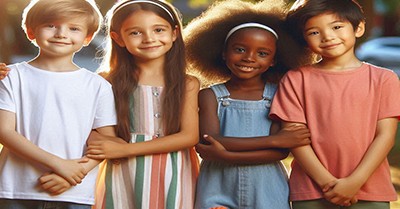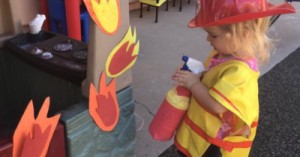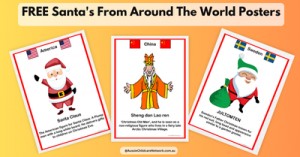Teaching preschoolers about Apology Day (13th February) can be both meaningful and age-appropriate. The following article provides information on Strategies To Teach Preschoolers About Apology Day, How To Explain Apology Day To Preschoolers, Best Books For Children About Apology Day, ATSI Books About Apology Day and more.
Strategies To Teach Preschoolers About Apology Day
1. Storytelling:
-
Read stories that highlight themes of apology, forgiveness, and reconciliation.
-
Choose books with simple language and engaging illustrations.
2. Circle Time Discussions:
-
Have a circle time where you talk about feelings, what it means to say sorry, and why it's important.
-
Use puppets or dolls to act out scenarios where characters apologize and forgive.
3. Art and Craft Activities:
-
Create apology cards where children can decorate and give them to someone they want to say sorry to.
-
Make a collaborative mural that represents kindness and togetherness.
4. Role-Playing:
-
Encourage children to role-play different situations where they might need to apologize.
-
Use costumes or props to make it more interactive and fun.
5. Songs and Rhymes:
-
Sing songs and rhymes about saying sorry and being kind.
-
Incorporate actions and movements to make the learning experience engaging.
6. Outdoor Activities:
-
Organize a nature walk and discuss how taking care of nature and saying sorry when we hurt the environment is important.
-
Collect natural items like leaves or flowers and create a "Sorry" collage.
7. Interactive Games:
-
Play games that emphasize taking turns, sharing, and saying sorry if someone gets hurt or upset.
-
Use games like "Duck, Duck, Goose" or "Musical Chairs" to teach these lessons.
8. Cultural Awareness:
-
Introduce preschoolers to the history and significance of Apology Day in an age-appropriate manner.
-
Use simple language and visuals to explain the importance of acknowledging past wrongs and working towards a better future.
9. Parental Involvement:
-
Encourage parents to talk about Apology Day at home and participate in related activities.
-
Provide resources like books or songs that parents can use to reinforce the lessons.
10. Visual Aids:
-
Use posters, flashcards, or videos that depict scenarios of apology and forgiveness.
-
Create a visual chart that shows steps for saying sorry and making amends.
These activities help introduce the concept of Apology Day in a way that preschoolers can understand and appreciate. It's a great opportunity to teach them about empathy, kindness, and the importance of reconciliation.
How To Explain Apology Day To Preschoolers
Example 1: Simple and Direct
"Today is Apology Day. It's a day when we say sorry for things that happened a long time ago. Saying sorry helps us feel better and makes others feel happy too. Just like when we say sorry to our friends if we accidentally hurt them."
Example 2: Using a Story
"Once upon a time, people made mistakes that hurt others. Apology Day is a special day to say sorry for those mistakes. When we say sorry, it shows we care and want to be kind. Just like in our storybooks, when characters say sorry and make friends again."
Example 3: Feelings Focus
"Apology Day is about understanding feelings. Sometimes people feel sad because of things that happened in the past. Saying sorry on Apology Day is like giving a big hug to make those sad feelings go away. It's important to say sorry when we make someone feel sad."
Example 4: Using a Puppet
"Mr. Bunny says, 'Today is Apology Day! It's a day to remember that saying sorry is very important. When I accidentally step on my friend's paw, I say sorry to make them feel better. Saying sorry shows we care about each other.'"
Example 5: Comparing to Everyday Life
"Apology Day is like when we say sorry if we accidentally knock over someone's blocks. It’s important to say sorry so we can be friends again and play together happily. Apology Day reminds us to be kind and say sorry when needed."
Example 6: Relatable Situations
"Apology Day is a special day when we remember to say sorry for things that happened a long time ago. It's like when we say sorry if we accidentally break a friend's toy. Saying sorry helps make things better and shows that we care."
Example 7: Comparing to Everyday Life
"Imagine if someone accidentally steps on your toes. They say sorry to make you feel better. Apology Day is when we say sorry for things that happened a long time ago to help everyone feel better and be friends again."
Example 8: Using Symbols
"Apology Day is like planting a seed. When we say sorry, it's like planting a kindness seed that grows into a beautiful flower. It helps to make things better and makes everyone happy."
Example 9: Emotional Connection
"Sometimes people feel sad because of things that happened before we were born. Apology Day is a special day to say sorry for those things and to show that we care. It's like giving a big hug to make someone feel better."
Example 10: Simplified History
"A long time ago, people did things that hurt others. Apology Day is a day when we say sorry for those things and promise to be kind and take care of each other. It's important to say sorry and make things better."
These explanations help convey the significance of Apology Day in ways that are easy for preschoolers to understand. It's all about teaching the importance of saying sorry and being kind to others.
Best Books For Children About Apology Day
Here are some wonderful books that can help children understand the concept of apologies and forgiveness:
1. "I'm Sorry" (The I'm Books) by Michael Ian Black and Debbie Ridpath Ohi
-
This book follows Potato as he learns to apologize to Flamingo after an accident. It's a sweet and humorous story that shows how healing an apology can be.
2. "How to Apologize" by David LaRochelle and Mike Wohnoutka
-
This book provides a simple and charming guide on how to apologize, covering everything from heartfelt apologies to avoiding hollow excuses.
3. "Sonny Says Mine!" by Caryl Hart and Zachariah Ohora
-
Sonny learns to share and apologize when he realizes he has taken someone else's toy. It's a great story about recognizing mistakes and making things right.
4. "Lilly's Purple Plastic Purse" by Kevin Henkes
-
Lilly learns the importance of apologizing when her teacher confiscates her purse. She realizes her mistake and makes amends with her teacher.
5. "Monster Knows I'm Sorry (Monster Knows Manners)" by Connie Rose Miller and Maira Kistemann Chiodi
-
This book teaches polite apologies and good manners in a fun and engaging way, perfect for young children.
6. "Kevin" by Rob Biddulph
-
Kevin learns that his actions affect others and that saying sorry is the best way to make things right. It's a playful yet meaningful story.
7. "My Friend Maggie" by Hannah E. Harrison
-
This story shows the importance of true friendship and forgiveness when Maggie stands up for her friend Paula after Paula's new friends turn on her.
8. "Snake's Big Mistake" by Sarah Kurpiel
-
Snake takes credit for a pottery piece that wasn't his and feels guilty. He learns to apologize and help his friend make a new pot, repairing their friendship.
9. "One Little Word" by Joseph Coelho and Allison Colpoys
-
An argument between two friends is personified by a growing monster, showing how an apology can shrink the monster and resolve the conflict.
10. "I'm Sorry You Got Mad" by Kyle Lukoff and Julie Kwon
-
Jack learns to write a sincere apology after knocking over Zoe's castle, evolving from angry statements to heartfelt confessions.
ATSI Books About Apology Day
Here are some excellent books that focus on Apology Day and themes of reconciliation and forgiveness, specifically related to Aboriginal and Torres Strait Islander (ATSI) perspectives:
1. "Sorry Day" by Coral Vass and Dub Leffler
-
This book tells the story of Maggie and her mother attending the National Apology to the Stolen Generations. It also includes a historical narrative about young Aboriginal children and their experiences. The illustrations and storytelling provide a poignant and educational experience.
2. "Sorry Sorry" by Anne Kerr and Marda Pitt
-
This picture book explores the history of Australia's First Nations people and the arrival of European settlers. It emphasizes the importance of saying sorry and the journey of reconciliation. The illustrations by Marda Pitt, an Aboriginal artist, add a rich cultural dimension to the story.
3. "My Place" by Sally Morgan
-
While not specifically about Apology Day, this book provides a powerful narrative about the experiences of Aboriginal people in Australia. It's a great resource for discussing themes of history, identity, and reconciliation.
4. "The Rabbits" by John Marsden and Shaun Tan
-
This allegorical picture book tells the story of the colonization of Australia from the perspective of the Aboriginal people. It's a visually stunning and emotionally impactful book that can be used to discuss themes of loss, resilience, and reconciliation.
5. "Welcome to Country" by Aunty Joy Murphy and Lisa Kennedy
-
This book provides a beautiful introduction to Aboriginal culture and traditions, including the importance of welcoming and respecting others. It's a great resource for discussing cultural awareness and reconciliation.
Further Reading
Ideas For Introducing Apology Day For Babies and Toddlers
Strategies To Support Children To Say Sorry Meaningfully
Aboriginal and Torres Strait Islander Resources, National Centre For Australian Children's Literature







 Open ended questions cannot be responded to with one word answers such as yes or no. These types of questions enables a child to provide
Open ended questions cannot be responded to with one word answers such as yes or no. These types of questions enables a child to provide During your child’s preschool years, an important milestone begins to emerge. This is the development of pre-writing skills. Pre-writing skills are used to encourage, develop
During your child’s preschool years, an important milestone begins to emerge. This is the development of pre-writing skills. Pre-writing skills are used to encourage, develop Open ended materials enables children to play freely. They are objects that have no rules to follow, use or function. Raw materials that can be
Open ended materials enables children to play freely. They are objects that have no rules to follow, use or function. Raw materials that can be An Acknowledgment of the Country is a way of showing respect for the Traditional Owners and can be given by both non-Indigenous people and Aboriginal
An Acknowledgment of the Country is a way of showing respect for the Traditional Owners and can be given by both non-Indigenous people and Aboriginal Language plays an important role in a child’s development. It enables a child to communicate effectively with their family, learn at school, socialize with friends,
Language plays an important role in a child’s development. It enables a child to communicate effectively with their family, learn at school, socialize with friends, Like adults, children have to deal with their own stress in life. Moving house, starting a new school, preparing for a new sibling - these are
Like adults, children have to deal with their own stress in life. Moving house, starting a new school, preparing for a new sibling - these are Playdough is such a versatile material. It provides numerous benefits to children as they manipulate it, it is safe and soothing and provides children with
Playdough is such a versatile material. It provides numerous benefits to children as they manipulate it, it is safe and soothing and provides children with Teaching children about sustainability enables them to appreciate and respect the natural environment. Early childhood services can provide meaningful hand on learning experiences in order
Teaching children about sustainability enables them to appreciate and respect the natural environment. Early childhood services can provide meaningful hand on learning experiences in order Recycling is an important concept that teaches children to care for the environment. It encourages children to be responsible and show a growing appreciating for
Recycling is an important concept that teaches children to care for the environment. It encourages children to be responsible and show a growing appreciating for When children apply paint to paper, glue things together, or pound a lump of clay, they experiment with colour, shape design and texture.
When children apply paint to paper, glue things together, or pound a lump of clay, they experiment with colour, shape design and texture.



